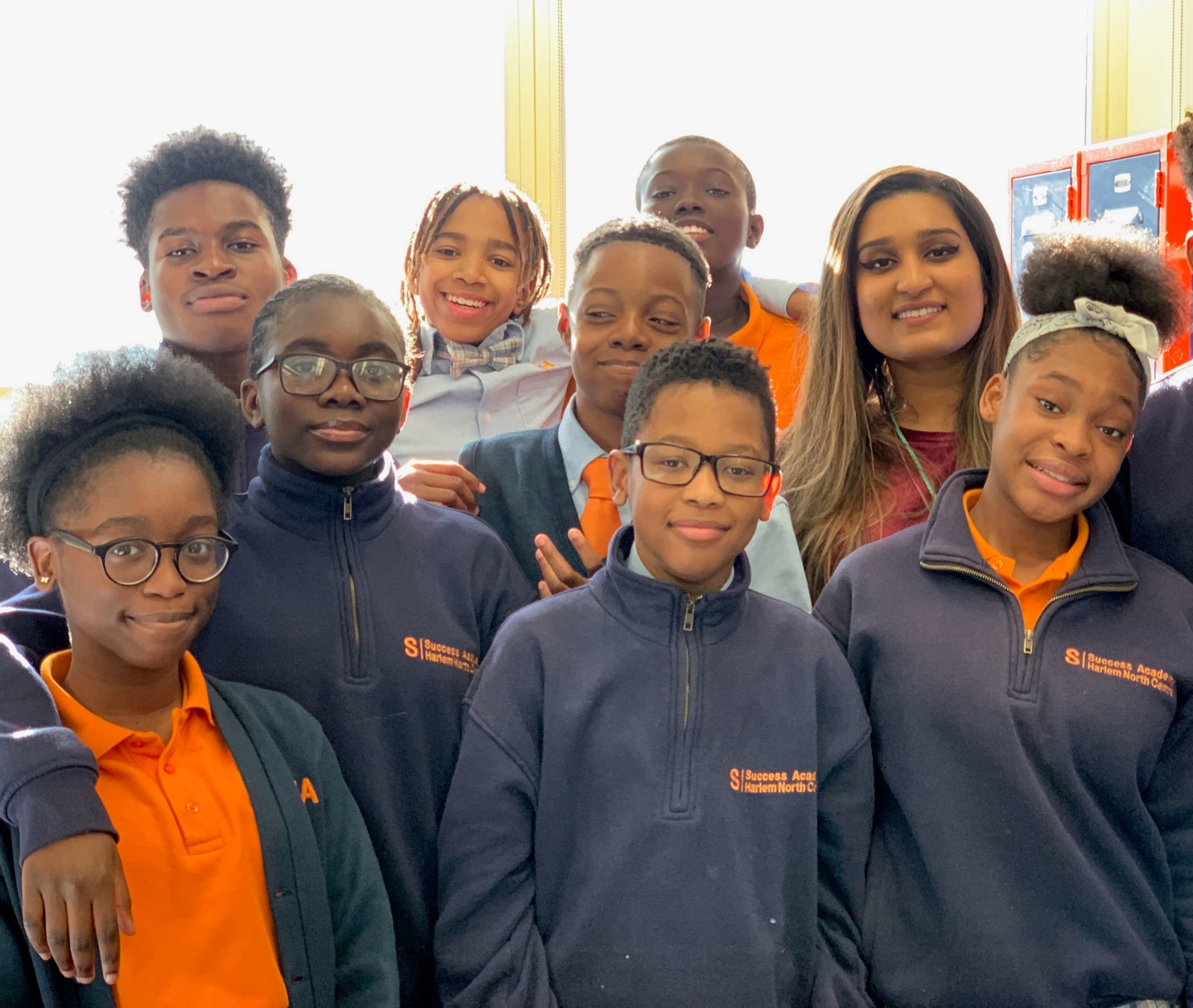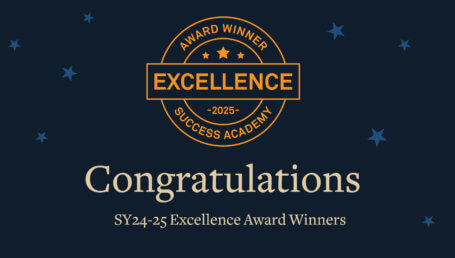
Eighth-grader Baila was speaking so quickly that he nearly ran out of breath. He waved his notes around in the air as he made his thoroughly researched points. In one breath, he huffed, as if to expel all of the energy from his body at once. “I don’t think that’s true,” Baila said, first looking at his notes, and then addressing the scholar at the opposite side of the room. “And I have evidence to prove it.”
Baila and his history classmates are participating in a debate culminating in the 8th grade Civil Rights Unit. This week at Success Academy Harlem North Central Middle School, they’ve been studying two influential Civil Rights activists — Martin Luther King, Jr., and Malcolm X — and their differing ideologies on how civil rights should be won. After learning that King advocated for nonviolent protests, while Malcolm X believed in equal rights by any means necessary, Baila and his classmates took all that they’d learned and debated the question: “To what extent was nonviolence effective during the Civil Rights Movement?”
These debates are a regular part of the Success Academy Middle School history curriculum. Throughout the year, Ms. Joseph and other SA history teachers build debates about historical figures and events into their lessons. For Ms. Joseph, who builds in a debate for every unit, that’s about seven times per year! By then, most of her middle schoolers have already taken at least one debate elective, and Ms. Joseph thinks it’s vital to apply the debate skills they’ve learned to historical contexts. “Debates help our scholars engage with and critically think about the significance of history in a way that textbooks alone just can’t provide. And of course, they help develop great qualities in middle schoolers like academic independence and evidence-based argumentation,” Ms. Joseph said. Then, she laughed. “And some kids can get extremely passionate about their side.”
So when Ms. Joseph posed her debate question, Baila had immediately set to work searching for and developing an argument, armed with the online resources Ms. Joseph had provided him on each activist. When Ms. Joseph asked her scholars to sit on a side of the class based on their choice, Baila sat on the Malcolm X side.
“Before we begin, who can tell me some characteristics of good debate etiquette?” Ms. Joseph asked. Dozens of hands shot up in the air at once. “Be respectful of other people’s opinions,” Baila said. “Don’t cut each other off,” another scholar, Aidan, added. “Think before you speak. Take time to consider the evidence you have that will support your argument,” said Aleena.
Ms. Joseph’s eyes lit up. “Yes! A strong argument has proof to back up the claim. And it’s good to think carefully so that you can articulate that proof with clarity.”
During the debate, Baila thought about Ms. Joseph’s words and slowed down before he continued his thought. “You might think because of his motto “by any means necessary” that Malcolm X advocated for violence,” he said. “But in 1959, Malcolm X said, ‘Our mission is not violence, but freedom.’ I think we need to shift our perspective of Malcom X — from a man provoking violence, to someone who is simply refusing to allow himself and his people to be oppressed.”
The class broke into a low murmur. It was Rae Anna, on the King Jr. side of the room, who spoke next, for the first time all class. The class immediately settled down as her quiet yet confident voice filled the classroom. “But how effective were his methods?” she asked. “Martin Luther King Jr.’s mindset on peaceful protests allowed him to work with the people who had all the power — white senators. This led to the March on Washington, which led to the Civil Rights Act of 1964, and eventually integration, which gave us all the opportunity to live and work and go to school together.”
“Don’t forget, though, that Malcolm X didn’t believe in integration,” said another scholar. “In a speech in 1963, he said he wished for black people to own their own economy, politics, and society. To him, separation from oppressors was true freedom. So how can we really measure effectiveness if MLK and Malcolm X had different goals?”
One by one, each side presented their arguments. They were passionate, but polite — scholars quieted their lively outbursts on their own, allowing the next scholar to take their turn. They quoted court cases and recalled each leader’s childhood events and speeches to make their points.
Allowing scholars to regulate their own debate is intentional, Ms. Joseph explained. “I think it’s so important for scholars to speak at least twice as much as I do. I want them to learn how to work through some of the messier parts of articulation and argumentation in real time, which just isn’t possible if I hold their hand through it — so aside from a follow-up question or two to push them, I let the debates happen organically.”
The scholars’ passion wasn’t limited to just their own ideas — they also listened to each other in earnest. They clapped each other on the back when an idea resonated with them, and even switched sides if an argument was particularly compelling. “Middle schoolers are in the unique position of desiring independence while still trying to figure out their identity. Often for the first time, they want to please their peers more than their teacher. So when we create a classroom culture where thinking is highly valued, they take even more pride in presenting their ideas to each other,” Ms. Joseph said.
“The ideas we’re exploring about how to handle inequality are just as relevant now as they were in the past,” Ms. Joseph said. “And I’ve seen firsthand how grappling with these ideas has transformed my kids and challenged them to apply them to our current state. And that’s exactly why we prioritize this kind of Project-Based Learning in middle school.”
Among the cheers of support, the kind rebuttals, and the changed minds are middle schoolers who are learning to think deeper, listen longer, and articulate better. These middle schoolers are on a path to citizenship characterized by being rational and informed — without fear of listening to each other.
Maybe we could all learn a little something from these scholars.










